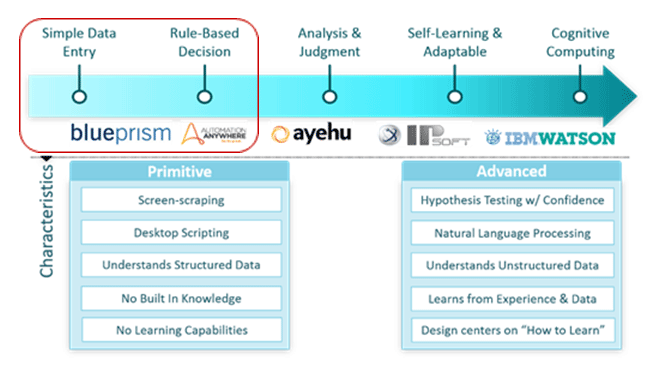Automation technologies cover a broad spectrum of capabilities, from robotic process automation (RPA) to deep machine learning and natural language processing. In the marketplace, RPA is considered the simplest form of automation, with easy-to-program applications for rules-based business processes and data entry as depicted in the red box in Figure 1 below. It has proven to be a smart investment for companies hoping to make big improvements in back-office efficiency and accuracy.

Figure 1: Automation technologies range from simple to complex, with RPA on the simple end of the spectrum.
Today, RPA is beginning to gain traction in applications management services (AMS) and production support with some early adopters deploying RPA bots to automatically resolve ticket problems, for example, or update a secondary and tertiary instance of an enterprise resource planning (ERP) application. Though both service providers and enterprises are turning to automation to drive down costs in outsourced managed services, many AMS contracts are lacking the appropriate language to help enterprises adequately govern the development and support of RPA.
Whether a company needs to modify a current AMS contract to include RPA for the first time or is considering including RPA in a new AMS contract, the following questions will need to be addressed:
- What path through the software development lifecycle (SDLC) do we use to minimize risk and maximize productivity?
- Who owns the RPA bot, its enabling code and the work steps associated with the enabling code once it is created?
- Where does funding of the RPA development and maintenance come from?
- How do we assign gainsharing of the savings that result from the RPA in production?
Read this ISG white paper What You Need to Know about Including RPA in Your AMS Managed Services Contract that explores how to address these four critical questions in new and existing AMS sourcing contracts.
About the authors
Scott Moore is an experienced IT professional who brings considerable knowledge of information services to ISG’s clients in his role as Principal Consultant. Scott has 30+ years of experience in the industry and proven leadership in application development and maintenance (ADM) delivery, designing solutions, global resourcing and delivery, transition management, and risk management. He has deep global experience from working with ADM delivery teams in Europe, South America, and Asia, and his client base spans a wide range of industries.
Michael Fullwood is an ISG Director with extensive Financial, Planning and Analysis experience. His areas of expertise include sourcing assessment and RFP management, contract negotiations and transitions. He has guided major multinational companies in the Americas and Europe through multi-functional outsourcing projects and shared services transformation. Prior to joining ISG, Michael was a Senior Advisor with TPI, a sourcing advisory firm; a Director with OPI, an outsourcing services provider; and a Director of FP&A for a global telecommunications firm.

